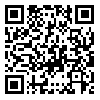Volume 22, Issue 5 (3-2023)
TB 2023, 22(5): 28-42 |
Back to browse issues page
Ethics code: IR.PNU.REC.1402.079
Download citation:
BibTeX | RIS | EndNote | Medlars | ProCite | Reference Manager | RefWorks
Send citation to:



BibTeX | RIS | EndNote | Medlars | ProCite | Reference Manager | RefWorks
Send citation to:
eatesamipour R, aynolahi marian N. Comparison of emotional reactivity and the ability to control thought in students with and without sleep disorder. TB 2023; 22 (5) :28-42
URL: http://tbj.ssu.ac.ir/article-1-3561-en.html
URL: http://tbj.ssu.ac.ir/article-1-3561-en.html
payamenoor university , r.eatesami@gmail.com
Abstract: (1208 Views)
Introduction: Sleep disorder is a condition characterized by disturbed patterns or behaviors related to sleep, and failure to meet this physiological need can compromised human life. The purpose of this research is to compare emotional reactivity and thought control ability in students with and without sleep disorder in Zanjan city.
Methods: This was a descriptive and causal-comparative research. 100 people (50 people with sleep disorder and 50 people without sleep disorder) were selected using random sampling method from the students of Payame Noor University Zanjan city in 2022. To collect data, the questionnaires of insomnia and hypersomnia screening by Zomer et al., thought control ability by Luciano et al. and emotional reactivity by Knock et al. were used. To analyze data, independent t-test and multivariate analysis of variancethrough SPSS version 26 software were used.
Results: Findings showed that there was a significant difference between students with and without sleep disorder regarding the components of emotional reactivity and the ability to control thoughts (P<0/05). Also, there was no significant difference between the emotional reactivity of male and female students (P<0/05), and there was a significant difference in the ability to control their thoughts between male and female students (P=0/001).
Conclusion: The findings showed that people with high emotional reactivity and lower thought control ability have more sleep disorders. Therefore, it is suggested to improve personal and social performance of students by identifying and eliminating personal and environmental factors governing sleep status of people, as well as providing appropriate educational programs.
Methods: This was a descriptive and causal-comparative research. 100 people (50 people with sleep disorder and 50 people without sleep disorder) were selected using random sampling method from the students of Payame Noor University Zanjan city in 2022. To collect data, the questionnaires of insomnia and hypersomnia screening by Zomer et al., thought control ability by Luciano et al. and emotional reactivity by Knock et al. were used. To analyze data, independent t-test and multivariate analysis of variancethrough SPSS version 26 software were used.
Results: Findings showed that there was a significant difference between students with and without sleep disorder regarding the components of emotional reactivity and the ability to control thoughts (P<0/05). Also, there was no significant difference between the emotional reactivity of male and female students (P<0/05), and there was a significant difference in the ability to control their thoughts between male and female students (P=0/001).
Conclusion: The findings showed that people with high emotional reactivity and lower thought control ability have more sleep disorders. Therefore, it is suggested to improve personal and social performance of students by identifying and eliminating personal and environmental factors governing sleep status of people, as well as providing appropriate educational programs.
Type of Study: Research |
Subject:
Psychology
Received: 2023/10/3 | Accepted: 2023/12/3 | Published: 2024/01/16
Received: 2023/10/3 | Accepted: 2023/12/3 | Published: 2024/01/16
Send email to the article author
| Rights and permissions | |
 |
This work is licensed under a Creative Commons Attribution-NonCommercial 4.0 International License. |







